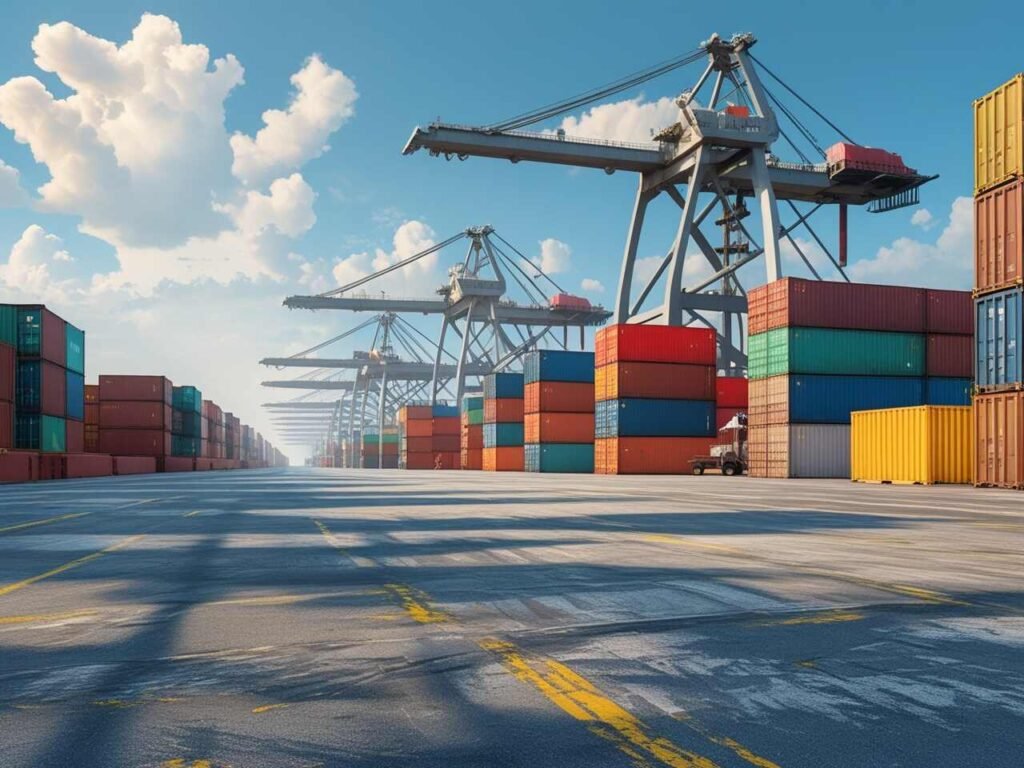- Home
- ScienceDiscover the latest updates from across the United States, including politics, culture, economy, and trending stories. Stay informed on the key events shaping the nation and the topics everyone’s talking about.
- EconomyOur Economy page provides comprehensive reporting on international financial systems, trade dynamics, development economics, and macroeconomic policy. Drawing on expert analysis and institutional data, we illuminate the interconnected nature of global markets and their real-world implications for governance and inequality.
- HealthWe examine global health issues through the lens of policy, access, equity, and innovation. From pandemics and healthcare infrastructure to mental health and biotechnological breakthroughs, our health reporting is rooted in empirical data, expert insight, and a commitment to understanding health as a cornerstone of human development.
- HistoryThis section revisits critical junctures in world history, emphasizing the relevance of historical events in shaping present-day global affairs. Through scholarly narratives and fact-anchored storytelling, we uncover the often-overlooked patterns, power structures, and human decisions that have left a lasting imprint on international relations and societies.
- PoliticsOur Politics section offers in-depth analysis of international political developments, ideological movements, and institutional shifts. With a focus on global governance, diplomacy, and geopolitical strategy, we provide nuanced reporting that transcends partisan narratives and situates events within their broader historical and structural contexts.
- War & ConflictThis section delivers meticulous coverage of international conflicts, civil wars, military strategies, and peace negotiations. We prioritize geopolitical context, long-term impact, and the role of state and non-state actors—eschewing sensationalism in favor of sober, historically informed analysis.
- TechnologyWe critically examine the global technology landscape—from artificial intelligence and cybersecurity to digital policy and ethical innovation. Our reporting focuses not just on what is being built, but why it matters: how technological change influences governance, economy, security, and human life on a planetary scale.
- Features
- Home
- ScienceDiscover the latest updates from across the United States, including politics, culture, economy, and trending stories. Stay informed on the key events shaping the nation and the topics everyone’s talking about.
- EconomyOur Economy page provides comprehensive reporting on international financial systems, trade dynamics, development economics, and macroeconomic policy. Drawing on expert analysis and institutional data, we illuminate the interconnected nature of global markets and their real-world implications for governance and inequality.
- HealthWe examine global health issues through the lens of policy, access, equity, and innovation. From pandemics and healthcare infrastructure to mental health and biotechnological breakthroughs, our health reporting is rooted in empirical data, expert insight, and a commitment to understanding health as a cornerstone of human development.
- HistoryThis section revisits critical junctures in world history, emphasizing the relevance of historical events in shaping present-day global affairs. Through scholarly narratives and fact-anchored storytelling, we uncover the often-overlooked patterns, power structures, and human decisions that have left a lasting imprint on international relations and societies.
- PoliticsOur Politics section offers in-depth analysis of international political developments, ideological movements, and institutional shifts. With a focus on global governance, diplomacy, and geopolitical strategy, we provide nuanced reporting that transcends partisan narratives and situates events within their broader historical and structural contexts.
- War & ConflictThis section delivers meticulous coverage of international conflicts, civil wars, military strategies, and peace negotiations. We prioritize geopolitical context, long-term impact, and the role of state and non-state actors—eschewing sensationalism in favor of sober, historically informed analysis.
- TechnologyWe critically examine the global technology landscape—from artificial intelligence and cybersecurity to digital policy and ethical innovation. Our reporting focuses not just on what is being built, but why it matters: how technological change influences governance, economy, security, and human life on a planetary scale.
- Features
Now Reading: Global Economy at a Pivotal Moment: BIS Warns of Fraying Financial Order
-
01
Global Economy at a Pivotal Moment: BIS Warns of Fraying Financial Order
- Home//
- Science//Discover the latest updates from across the United States, including politics, culture, economy, and trending stories. Stay informed on the key events shaping the nation and the topics everyone’s talking about.
- Economy//Our Economy page provides comprehensive reporting on international financial systems, trade dynamics, development economics, and macroeconomic policy. Drawing on expert analysis and institutional data, we illuminate the interconnected nature of global markets and their real-world implications for governance and inequality.
- Health//We examine global health issues through the lens of policy, access, equity, and innovation. From pandemics and healthcare infrastructure to mental health and biotechnological breakthroughs, our health reporting is rooted in empirical data, expert insight, and a commitment to understanding health as a cornerstone of human development.
- History//This section revisits critical junctures in world history, emphasizing the relevance of historical events in shaping present-day global affairs. Through scholarly narratives and fact-anchored storytelling, we uncover the often-overlooked patterns, power structures, and human decisions that have left a lasting imprint on international relations and societies.
- Politics//Our Politics section offers in-depth analysis of international political developments, ideological movements, and institutional shifts. With a focus on global governance, diplomacy, and geopolitical strategy, we provide nuanced reporting that transcends partisan narratives and situates events within their broader historical and structural contexts.
- War & Conflict//This section delivers meticulous coverage of international conflicts, civil wars, military strategies, and peace negotiations. We prioritize geopolitical context, long-term impact, and the role of state and non-state actors—eschewing sensationalism in favor of sober, historically informed analysis.
- Technology//We critically examine the global technology landscape—from artificial intelligence and cybersecurity to digital policy and ethical innovation. Our reporting focuses not just on what is being built, but why it matters: how technological change influences governance, economy, security, and human life on a planetary scale.
- Features//
Global Economy at a Pivotal Moment: BIS Warns of Fraying Financial Order
Jhon SmithEconomyJune 30, 202593 Views

The global economy faces mounting uncertainty as the Bank for International Settlements (BIS) issues a stark warning in its June 29 annual report, highlighting growing financial system risks driven by escalating trade tensions, geopolitical instability, and structural vulnerabilities. Known as the “central bankers’ central bank,” the BIS plays a pivotal role in fostering cooperation among global monetary authorities and monitoring systemic risks that could threaten economic stability worldwide.
The 2025 BIS report emphasizes that intensifying protectionist policies and unresolved geopolitical conflicts, including ongoing tensions between major powers, are fracturing the global financial order. These pressures exacerbate weaknesses exposed during the post-pandemic recovery, particularly in fragile supply chains and debt sustainability. The report underscores that such fractures risk undermining market confidence and disrupting capital flows, with potential ripple effects across both advanced and emerging economies.
By spotlighting these challenges, the BIS signals a critical juncture for central banks and governments globally. Its assessment draws on comprehensive data and expert analysis, reinforcing its reputation as a trusted voice in international finance. The report calls for coordinated policy responses to address these systemic risks before they escalate into broader crises.
With trade tensions lingering and global political uncertainty showing no sign of easing, the Bank for International Settlements (BIS) cautions that failure to act could put severe pressure on the pillars that uphold the world economy. Policymakers must therefore prioritize stability and cooperation to safeguard financial systems and promote sustainable economic growth in an increasingly volatile international landscape.
BIS Alarm
The Bank for International Settlements (BIS), widely known as the “central bankers’ central bank,” has issued a stark warning in its 2025 annual report, released on June 29, about deepening vulnerabilities in the global economy. Established in 1930 and based in Basel, Switzerland, the Bank for International Settlements (BIS) acts as a key meeting point for 63 central banks whose countries together generate nearly 95% of the world’s total GDP. Its role is to foster international monetary and financial cooperation, provide banking services to central banks, and produce critical research that helps shape global policy.
In its recent report, the BIS warns of rising risks to the global financial system, citing increasing trade disputes, ongoing geopolitical tensions, and deep-rooted structural economic problems. According to the report, unresolved trade disputes and a resurgence of protectionist measures threaten to weaken cross-border investments and disrupt already fragile supply chains. The BIS also warns that increasing geopolitical conflicts could amplify market volatility and undermine investor confidence at a time when global debt levels remain historically high.
This fresh alarm underscores the BIS’s reputation as an authoritative voice in spotting early signs of systemic stress. Its data and policy coordination help central banks manage crises before they spiral into broader economic shocks. As the BIS cautions, failing to address these emerging fault lines could expose the world economy to severe disruption. The central bankers’ central bank stresses that policymakers must respond decisively to safeguard global financial stability and prevent these risks from turning into larger crises.
Trade Tensions
Rising protectionism and tariff battles are emerging as critical threats to the global economy, the 2025 BIS annual report warns. Protectionism — the practice of shielding domestic industries by imposing trade barriers — has resurfaced as countries respond to shifting geopolitical and economic pressures. According to the BIS, recent moves such as the upcoming U.S. tariff deadline on July 9 are likely to escalate trade tensions with China and the European Union, risking broader disruptions to supply chains already under strain.
The BIS warning highlights that retaliatory tariffs and protracted trade disputes can fragment established trade routes and reduce market access for exporters, compounding financial system risks. For instance, the European Commission’s new tariff threats on Chinese electric vehicles have further strained EU–China relations, while Washington’s push for higher steel and semiconductor duties could trigger countermeasures from key trading partners.
These protectionist shifts not only hamper cross-border investment but also heighten market uncertainty, discouraging businesses from long-term planning. The BIS stresses that unchecked trade frictions can weaken global growth potential and increase systemic vulnerabilities, particularly for emerging markets reliant on stable export flows. If left unresolved, these growing trade tensions could widen existing cracks in the world’s financial architecture, demanding urgent diplomatic and policy responses to safeguard stability.
Geopolitical Risks
The 2025 BIS annual report singles out escalating geopolitical instability as a critical threat amplifying financial risk across the global economy. Ongoing conflicts, particularly the protracted Ukraine war, continue to disrupt energy markets and raise security costs for Europe, with ripple effects on commodity prices and investor confidence. According to the BIS, the unpredictable trajectory of this conflict makes forecasting and hedging risk more complex for central banks and global investors.
Tensions between the United States and China have also intensified, with fresh restrictions on high-tech exports and competing claims over supply chain security. The BIS warns that these strategic rivalries risk fragmenting global trade routes and driving up operational costs for multinational firms, adding layers of uncertainty to investment flows.
Renewed instability in the Middle East, including periodic escalations involving Iran-backed groups and regional powers, threatens key shipping lanes and oil supply chains. Any prolonged disruption could trigger price shocks that central banks may struggle to absorb, further raising financial risk for already fragile markets.
The BIS also emphasizes that ongoing geopolitical hotspots bring unpredictable risks to today’s deeply connected global economic system. As the report stresses, failure to manage these conflicts could widen existing cracks in the financial system, demanding urgent diplomatic efforts to limit wider fallout.
Policy Response
In its 2025 annual report, the Bank for International Settlements (BIS) underscores that addressing today’s systemic cracks will require carefully calibrated policy responses from central banks and governments worldwide. As financial system risks deepen, monetary authorities are considering a mix of tried-and-tested tools and fresh strategies to protect financial stability.
One key monetary policy tool remains interest rate adjustments. By raising or lowering benchmark rates, central banks aim to control inflation while keeping credit conditions supportive of growth. However, the BIS warns that high global debt makes aggressive rate hikes risky, potentially exposing vulnerable economies to refinancing stress. The 2008 global financial crisis showed how rapid cuts in interest rates, paired with coordinated policy easing, could help unfreeze credit markets.
Another option is quantitative easing (QE) or its opposite, tightening. During COVID-19, large-scale QE saw central banks buy government and corporate bonds to inject liquidity, stabilizing markets and lowering borrowing costs. Today, with balance sheets stretched and inflation concerns lingering, the BIS stresses that using these levers demands caution.
Governments may also need to deploy debt restructuring programs for heavily indebted sectors or nations. Well-managed restructurings can prevent cascading defaults that would otherwise amplify financial system cracks. Alongside this, central banks may activate emergency lending facilities to backstop distressed financial institutions — just as the U.S. Federal Reserve and European Central Bank did during the 2008 crisis and the pandemic.
To safeguard global liquidity, the BIS often coordinates currency swap lines between major central banks, enabling them to supply foreign currency funding during market stress. This technical support prevents abrupt currency shortages that could cripple trade or investment flows.
Beyond direct interventions, the BIS plays a crucial role in setting standards for reserve buffers, recommending stress tests for banks with high exposure to geopolitical shocks or fragile supply chains. By sharing technical guidance and data, BIS coordination ensures that policy responses are more aligned, reducing risks of policy missteps that might deepen uncertainty.
As the BIS cautions, the effectiveness of these policy responses will shape whether this pivotal moment restores confidence in the global economy — or leaves its financial foundations more fragile than before.





























